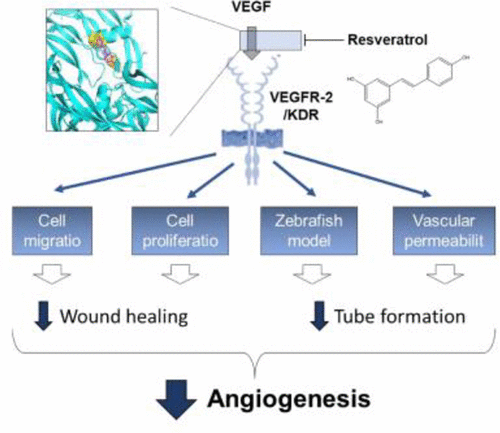当前位置:
X-MOL 学术
›
J. Agric. Food Chem.
›
论文详情
Our official English website, www.x-mol.net, welcomes your
feedback! (Note: you will need to create a separate account there.)
Binding of Resveratrol to Vascular Endothelial Growth Factor Suppresses Angiogenesis by Inhibiting the Receptor Signaling
Journal of Agricultural and Food Chemistry ( IF 5.7 ) Pub Date : 2018-12-10 00:00:00 , DOI: 10.1021/acs.jafc.8b05977 Wei-Hui Hu 1, 2 , Ran Duan 1, 2 , Yi-Teng Xia 1, 2 , Qing-Ping Xiong 2, 3 , Huai-You Wang 1, 2 , Gallant Kar-Lun Chan 1, 2 , Si-Yue Liu 2 , Tina Ting-Xia Dong 1, 2, 4 , Qi-Wei Qin 4 , Karl Wah-Keung Tsim 1, 2, 4
Journal of Agricultural and Food Chemistry ( IF 5.7 ) Pub Date : 2018-12-10 00:00:00 , DOI: 10.1021/acs.jafc.8b05977 Wei-Hui Hu 1, 2 , Ran Duan 1, 2 , Yi-Teng Xia 1, 2 , Qing-Ping Xiong 2, 3 , Huai-You Wang 1, 2 , Gallant Kar-Lun Chan 1, 2 , Si-Yue Liu 2 , Tina Ting-Xia Dong 1, 2, 4 , Qi-Wei Qin 4 , Karl Wah-Keung Tsim 1, 2, 4
Affiliation

|
Resveratrol is a polyphenol commonly found in plants and food health products, such as grape and red wine, and was identified for its binding to vascular endothelial growth factor (VEGF) by using HerboChips screening. The binding, therefore, resulted in alterations of VEGF binding to its receptor and revealed the roles of VEGF in angiogenesis. Several lines of evidence gave support to the inhibitory activities of resveratrol in VEGF-triggered angiogenesis. In human umbilical vein endothelial cells (HUVECs), compared with a VEGF-induced group, resveratrol, at a high concentration, suppressed VEGF-mediated endothelial cell proliferation, cell migration, cell invasion, and tube formation by 80 ± 9.01%, 140 ± 3.78%, 110 ± 7.51%, and 120 ± 10.26%, respectively. Moreover, resveratrol inhibited the subintestinal vessel formation in zebrafish embryo. In signaling cascades, application of resveratrol in HUVECs reduced the VEGF-triggered VEGF receptor 2 phosphorylation and c-Jun N-terminal kinase phosphorylation. Moreover, the VEGF-mediated phosphorylations of endothelial nitric oxide synthase, protein kinase B, and extracellular signal-regulated kinase were obviously decreased by (3 ± 0.37)-, (2 ± 0.27)- and (6 ± 0.23)-fold, respectively, in the presence of resveratrol at high concentration. Parallelly, the VEGF-induced reactive oxygen species formation was significantly decreased by 50 ± 7.88% to 120 ± 14.82% under resveratrol treatment. Thus, our results provided support to the antiangiogenic roles of resveratrol, as well as its related signaling mechanisms, in attenuating the VEGF-mediated responses. The present results supported possible development of resveratrol, which should be considered as a therapeutic agent in terms of prevention and clinical treatment of diseases related to angiogenesis.
中文翻译:

白藜芦醇与血管内皮生长因子的结合通过抑制受体信号转导抑制血管生成。
白藜芦醇是一种常见于植物和食品保健产品(例如葡萄和红酒)中的多酚,通过使用HerboChips筛选法鉴定其与血管内皮生长因子(VEGF)的结合。因此,该结合导致VEGF与其受体结合的改变,并揭示了VEGF在血管生成中的作用。一些证据支持白藜芦醇在VEGF触发的血管生成中的抑制活性。在人脐静脉内皮细胞(HUVEC)中,与VEGF诱导组相比,白藜芦醇在高浓度下可抑制VEGF介导的内皮细胞增殖,细胞迁移,细胞侵袭和管形成,幅度为80±9.01%,140±分别为3.78%,110±7.51%和120±10.26%。此外,白藜芦醇抑制斑马鱼胚胎中肠下血管的形成。在信号级联反应中,白藜芦醇在HUVEC中的应用减少了VEGF触发的VEGF受体2的磷酸化和c-Jun N端激酶的磷酸化。此外,VEGF介导的内皮一氧化氮合酶,蛋白激酶B和细胞外信号调节激酶的磷酸化分别明显降低(3±0.37)-,(2±0.27)-和(6±0.23)-倍。 ,在高浓度白藜芦醇存在下。同时,在白藜芦醇处理下,VEGF诱导的活性氧的形成显着减少了50±7.88%至120±14.82%。因此,我们的结果为白藜芦醇的抗血管生成作用及其相关的信号传导机制在减弱VEGF介导的反应中提供了支持。目前的结果支持了白藜芦醇的可能开发,
更新日期:2018-12-10
中文翻译:

白藜芦醇与血管内皮生长因子的结合通过抑制受体信号转导抑制血管生成。
白藜芦醇是一种常见于植物和食品保健产品(例如葡萄和红酒)中的多酚,通过使用HerboChips筛选法鉴定其与血管内皮生长因子(VEGF)的结合。因此,该结合导致VEGF与其受体结合的改变,并揭示了VEGF在血管生成中的作用。一些证据支持白藜芦醇在VEGF触发的血管生成中的抑制活性。在人脐静脉内皮细胞(HUVEC)中,与VEGF诱导组相比,白藜芦醇在高浓度下可抑制VEGF介导的内皮细胞增殖,细胞迁移,细胞侵袭和管形成,幅度为80±9.01%,140±分别为3.78%,110±7.51%和120±10.26%。此外,白藜芦醇抑制斑马鱼胚胎中肠下血管的形成。在信号级联反应中,白藜芦醇在HUVEC中的应用减少了VEGF触发的VEGF受体2的磷酸化和c-Jun N端激酶的磷酸化。此外,VEGF介导的内皮一氧化氮合酶,蛋白激酶B和细胞外信号调节激酶的磷酸化分别明显降低(3±0.37)-,(2±0.27)-和(6±0.23)-倍。 ,在高浓度白藜芦醇存在下。同时,在白藜芦醇处理下,VEGF诱导的活性氧的形成显着减少了50±7.88%至120±14.82%。因此,我们的结果为白藜芦醇的抗血管生成作用及其相关的信号传导机制在减弱VEGF介导的反应中提供了支持。目前的结果支持了白藜芦醇的可能开发,











































 京公网安备 11010802027423号
京公网安备 11010802027423号